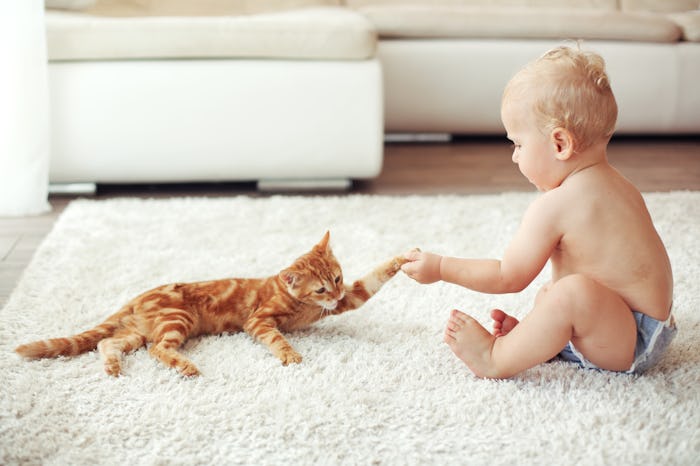For so many of us, our furry companions are family. And while our fur babies and human babies can get along swimmingly, there is a definite transition period that can be, at times, taxing. The same can be said for a visiting baby and/or feline friend, which is why I have more than a few rules for your cat around my baby. After all, it's better to be safe than sorry.
According to the American Society for the Prevention of Cruelty to Animals (ASPCA), some cats don't adjust well to change. So a crying, curious baby might be a little bit of a shock. As a result, a cat may either run and hide or feel threatened and become aggressive. Pam Johnson-Bennet, author of over 10 bestselling books and a pioneer in cat behavioral consulting, suggests having the owner of the cat(s) prepare the feline before any miniature visitors arrive. That could mean making the cat comfortable in another part of the home, or giving them extra play time and attention with toys, so they don't become jealous or territorial.
No matter how loving some felines are, or how splendidly they may get along with a tiny human being, here are some rules I think everyone should follow that'll make sure all parties stay safe when someone brings a cat around a baby.
Put Your Cat In Another Room During The Visit
If I'm bringing my newborn over to your home, I don't think it's out of line to ask that you put the cat in another part of the house. According to Cat-World.Com, if the cat is an indoor/outdoor cat, it can carry around salmonella, Cat Scratch Disease (although rare), or ringworm and, honestly, I just don't want around my brand new baby.
Have Your Cat Sniff A Baby-Scented Object First
The Humane Society says that to keep any pet calm during a newborn visit, you should let them sniff something of the baby's, and to let them view you interacting with the baby, so they learn to associate the experience as a positive.
Share Where The Litter Box Is & Wash Your Hands
Cornell University College of Veterinary Medicine explains that cats could harbor a single-celled parasite called Toxoplasma gondii (T. gondii), which is "the most common parasitic diseases and has been found in nearly all warm-blooded animals." Cats shed this parasite in their feces for seven-21 days, if infected (which can happen if they go outside and eat wild animals). PetsAndParasites.org says a common way to become infected with the parasite yourself — or your baby — is if the litter box cleaner hasn't washed their hands, and then proceeds contact with you or your baby. Symptoms may include flu-like symptoms, fever, headache and muscle aches, sore throat and swollen neck.
Don't Let Your Cat Sleep Near The Baby
So that old wives' tale about cats sucking the breath from a baby? yeah, not true. But there's always the chance of accidental suffocation if the cat seems hellbent on staying close to my baby when they sleep. So either supervise the cat the entire time, or don't let them sleep around the baby at all.
Treat Your Cat For Fleas
Dr. Ann L. Huntington, DVM of Suffield Veterinary Hospital, tells Petful.com that if the cat has fleas, or hasn't been treated for fleas, a baby in contact with that cat could develop an irritating rash. It's not life-threatening but, well, it's not exactly fun, either.
Watch The Cat When They're Around The Baby
It should go without saying, but if you're going to have a cat around a baby, keep an eye out. Cats, no matter how well-behaved, can get scared, feel territorial, or simply want to snuggle a little too close for comfort. Family pets should always be treated with respect, of course, but when it comes to my baby I definitely want to make sure everyone involved stays safe.
Check out Romper's new video series, Bearing The Motherload, where disagreeing parents from different sides of an issue sit down with a mediator and talk about how to support (and not judge) each other’s parenting perspectives. New episodes air Mondays on Facebook.
